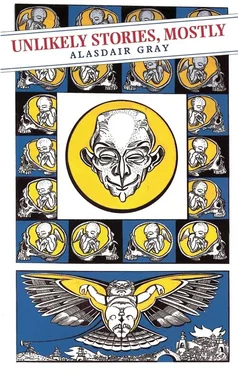The saint said, “That is not necessary. The dream is now travelling towards you. Only one more thing is needed to make sure it arrives.”
He beat the emperor again and the emperor did not notice, then he picked the emperor up and walked from the cave and laid him on the litter prepared by the soldiers. He said to the commanding officer, “Carry your master carefully, for he is in a very sacred condition. Write down everything he says because now his words are important. And if he recovers tell him not to apologize for what he bribed me to do. Giving men dreams is my only talent. I never have them myself.”
The emperor was carried to the hub in slow stages for he was very ill and often delirious. At the first stopping-place he dreamed of the axletree. He saw the great wheel of empire lying flat and millions of people flowing down the roads to the hub. From the hub a great smooth shaft ascended to the sky and ended in the centre of the sun. And he saw this shaft was a tower, and that everyone who had lived and died on earth was climbing up by a winding stair to the white light at the top. Then he saw this light was not the sun but a flame or a flame-shaped opening in the sky, and all the people were passing through and dissolving in the dazzling white.
For a month after his return the emperor saw nobody but doctors and the architect of the city’s building programme, then he called the leaders of the empire to his bedside. His appearance shocked them. Although he had reacted against a libertine father by tackling the worries of government he had been a robust, stout, stolid man. His body was now almost starved to a skeleton, the lines of care on his face were like deep cracks in an old wooden statue, his skin, against the bank of pillows supporting him, looked livid yellow; yet he regarded the visitors with an expression of peculiar levity. His voice was so strong and hollow that he had to rest between sentences, and at these moments he sucked in his lips and bit them as if to prevent laughter. He waited until everybody was comfortably seated before speaking.
“My political researches outside the rim have damaged my kidneys and I cannot live much longer. I have decided that for a few years most of the empire’s revenue will be used to build me a tomb. I invite you to form a company responsible for this building. Your time is precious, I don’t expect you to give it for nothing, and, if things go as I plan, work for this company will double your present incomes. If anyone dies before the great work is complete the salary will go to his successor.”
He rested until expressions of regret, loyalty and gratitude died away then indicated some architectural drawings on the wall near the bed. He said, “Here are the plans of the tomb. The basic shape is a steep cone with a ramp winding up. It is designed so that it can be enlarged indefinitely. I have not indicated the size of the completed work. Yourselves or posterity can decide that. My body will lie in a vault cut into the rock below the foundation. It will be a large vault, for I expect my descendants will also lie there.”
He smiled at the heir to the throne then nodded kindly at the others.
“Perhaps, gentlemen, you will make the tomb so big that you will be able to bury yourselves and your families in chambers adjacent to mine. Indeed, I would like even quite humble people who help the great effort to end under it, although their graves would naturally be narrower and less well furnished than ours. But you will decide these things. As to the site of the structure, it will be in the exact centre of the city, the exact centre of the empire. Has the high priest of war and thunder anything to say?”
The head of the state religion shrugged uneasily and said, “Sir, everyone knows that spot is the most sacred in the empire. My temple stands there. It was built by the hero who founded our nation. Will you knock it down?”
The emperor said, “I will rebuild it on a grander scale than ever before. The space above the burial chambers will be a pantheon to all the gods of our heaven and empire, for a great building must serve the living as well as the dead, or nobody will take it seriously for long. And my tomb will have room for more than a mere temple, even though that temple is the biggest in the world. Look again at the plans. The temple is the circular core of the building. Vast stone piers radiate from it, piers joined by arching vaults and pierced by arched doors. The spaces between the piers can be made wide enough to hold markets, factories and assembly rooms. These spaces are linked by curving avenues ascending at a slope gradual enough to race horses up. As you know, when I came to the throne I swore to rebuild our city on a grander scale than ever before. And what is a city but a great house shared by a community? The wealthy will have mansions in it, the poor can rent apartments. Parks and gardens will be planted along the outer terraces. And you, the construction company, will have your offices in the summit. As this rises higher the whole administration of the empire will move in beneath you … But a dying man should not look so far ahead. What do our businessmen say? Can they supply the materials to build on an increasingly large scale for generations to come? Can they provide food for a steadily enlarging labour force? I ask the heads of the corn and stock exchanges to give an opinion. Don’t consider the matter as salaried members of the construction company, but as managers of the empire’s trade.”
Toward the end of the emperor’s speech the faces of the leading businessmen had acquired a dreamy, speculative look, but the head of the stock exchange roused himself and said, “We can tackle that, certainly, if the government pay us to do so.”
Everyone looked at the civil service chief, who was also the imperial accountant.
He said slowly, “Ever since our armies reached the rim our provinces have been complaining about heavy taxation. We could once justify that by attacking enemies outside the borders. We have no enemies now, but if we allow the provinces to grow rich they will break away from us. Yes, we can certainly finance this structure. And there will be no shortage of labour. We are already paying huge doles to the unemployed, merely to stop them revolting against us.”
The commander of the armed forces said, “Will expenditure on this building require a reduction in the armed forces?”
The imperial accountant said, “Oh no! The army may even have to be enlarged, to keep the taxes coming in.”
“Then I like the idea. The emperor has called the structure a great house. I call it a castle. At present the city has overflowed the old fortifications, our hub is a sprawling, indefensible mess. A high walled city will not only be easier to defend, it could be easier to police. Let the great doors between the different levels of the structure have heavy portcullises in them. Then with very little effort we can imprison and starve any part of the population which gets out of hand.”
“But the outer walls must be faced with shining marble!” cried the head of the arts council. “If it looks beautiful from a distance I am sure foreign provinces will gladly let us continue taking their food, materials and men at the old cheap rate. Everyone wants to admire something wonderful, support something excellent, be part of something splendid which will not fail or die. Are you all right, sir?”
The emperor was shuddering with what seemed silent laughter but his teeth rattled and his brows sweated so it was probably fever. When he recovered he apologized then said, “Now I will tell you a dream I had.”
He told them the dream of the axletree.
“Sir!” said the high priest in an inspired voice, “You have given the empire a new way to grow! You have offered a solution to the political problem of the age, and mentioned the dream which gave the idea as an afterthought. But all dreams are sacred, and the dreams of a ruler are most sacred of all. Perhaps the heavenly gods are growing lonely. Perhaps mankind is becoming fit to join them. Let us tell the world this dream. You may be the prophet who will lead us all to the golden garden in the sky.” “I like that idea,” said the emperor languidly. “And, certainly, let people know the dream occurred. But don’t explain it, at this stage. You would antagonize religions whose prophet has already arrived. When the temple part of the building is complete dedicate it to god and his true prophet, but don’t name them. Keep the official religion a kind of cavity which other religions can hope to fill if they grow big enough. But you mentioned gold. In spite of his mad spending my father left a fortune which I have been able to increase. I want it all converted into gold and placed beside my body in the vault. Let people know that the construction company can use it in emergencies. But never do so. The fact that it exists and you own it will give the company more power over men than mere spending could give. Lend on the security of this gold, borrow on the security of this gold, if creditors press you hard cheat upon the security of this gold. But never, never touch it.”
Читать дальше












